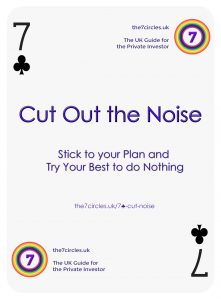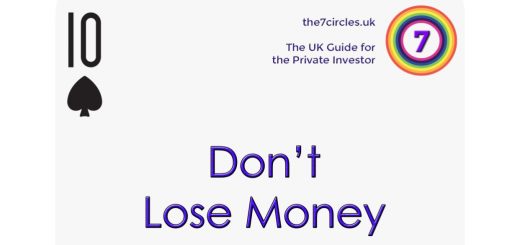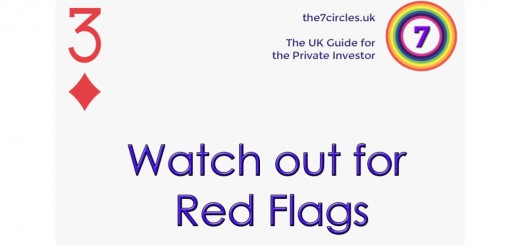7♣ – Cut Out the Noise
Cut Out The Noise - Stick to your plan and try your best to do nothing
This post is part of the MoneyDeck series, a pack of 52 playing cards that describe 52 “golden rules” for Private Investors in the UK.
Cut Out The Noise – Stick to your plan and try your best to do nothing
One of the secrets to successful long-term investing is learning to cut out the noise.
- It’s also great for your stress levels and your sanity.
It’s probably no coincidence that Warren Buffet is based in Omaha, Nebraska rather than on Wall Street.
Today we’re going to look at exactly what noise is, how best to ignore it, and the differences you can expect from doing so.
We shouldn’t really think about noise on its own.
Noise is one half of the signal-to-noise ratio.
- This is a term from science and engineering which compares the level of the thing you want (the signal) to the distracting stuff that surrounds it.
I first came across the term in my undergraduate acoustics class, but the term is also used in electronics and in biochemical signalling.
- More recently it has been used in information theory, to look at the ratio of useful information to false or irrelevant data in a conversation.
In investing, noise tends to be irrelevant speculation or opinion that confuses your perception of the underlying trends.
- In short-term trading, a lot of noise is generated by automatic or program trading.
- Another layer of noise is added by professional traders trying to manipulate the market’s initial reaction to “news” in order to manufacture an advantage for themselves.
Stops and limits can exaggerate these effects, and at the limit you end up with a “flash crash” as we notably saw a few years ago in the US markets, and a few weeks ago in the sterling / dollar FX market.
Don’t pay a lot of attention to the volatility in the market place. All these noises and jumping up and down along the way are really just emotions that confuse you – John Bogle
Volatility is far from synonymous with risk – Warren Buffett
You will never reach your destination if you stop and throw stones at every dog that barks – Winston Churchill
When I started investing in the 1980s, cutting out the noise was relatively simple.
- The mainstream media didn’t cover finance too much – I think the level of the FTSE-100 made the main news bulletin each evening.
- You could read the FT in the morning, and then you would have to wait until the next morning for an update.
- And of course the world-wide-web didn’t exist. ((The underlying internet was in place, but financial information was hard to find on it ))
When I moved to London a couple of years later, the afternoon and evening papers carried share prices.
- But you had to pay for newspapers in those days, and not many people bought more than one paper a day.
- Now of course, most people don’t buy even one.
Financial information is now available on the phone in your pocket, wherever you may be.
- And not just financial information – we are all suffering from information overload.
And there’s a bias to all this information – a negative bias.
- Doom and gloom sells, whereas “things will probably work out okay” and “sales expectations met” won’t make the front page.
- “If it bleed, it leads” is the news industry motto.
Yet for investors, history is almost always on the side of the optimists.
- So Keep Calm, and Carry On Investing, no matter which disaster the evening news has fixated on.
- And by Carry On Investing, we mostly mean Do Nothing.
The most obvious form of investment noise is that generated either deliberately (by those with a trading agenda, or with something to sell) or unknowingly (by those who are out of their depth) on bulletin boards and other online discussion forums, most notably Twitter. ((Of which I am an enthusiastic user – please follow me here ))
But this is not the noise we are looking for.
- The pump and dump merchants are easy to identify and ignore ((Alternatively, you can set up a dedicated Tweet-stream in a tool like Tweetdeck in order to benefit from free all-day entertainment ))
Another source of noise that is relatively easy to avoid for the private investor is the investment management industry itself.
By now, everybody knows that regular investment into boring passive index funds (OEICs or ETFS, whichever are cheapest for you at the time) will beat 99% of active management strategies in the long run.
- But there’s an entire industry dedicated to throwing doubt on that idea, and to making investing seem more complicated than it is.
They have to eat (very well) and we all have a hard time at first believing that the cheapest and simplest approach is actually one of the best.
- But it’s true.
- Remember that the hard part about investing isn’t understanding what to do, it’s doing it.
The first step to avoiding industry noise is to Do It Yourself.
- Without an adviser, you’ll miss 50% of the hubbub
But you’ll still need to use a platform, and they’ll send you a regular magazine (electronic if your lucky, glossy paper if you’re not) suggesting ideas whose time has come.
- Just chuck them in the bin (real or electronic).
The real problem for investors is the news.
- Every day the mainstream media and the financial press analyse what happened yesterday, what’s happening today and what might happen tomorrow (or even next year).
- Then they tell you how they feel about it, and how everybody else feels about it.
The rise of smartphones and the internet has produced an almost insatiable appetite for “content”.
- There are more TV channels, newsletters and magazines devoted to financial matters than ever before.
- Some commentators have described this as “investment porn”.
- But as we know from satellite TV, 500 channels might sound good, but if 495 of are full of crap, have we really made any progress?
Even if these guys knew what they were talking about (and the vast majority are just hacks who don’t invest in real life), listening to them would be a bad idea.
- Because you would be the last to hear about something.
- Today, investment news disseminates in seconds, and you have to be sitting at a terminal all day to take advantage.
- By the time a story hits the BBC news, it’s over, and probably time to head in the opposite direction.
Just remember – these people need your attention, your subscriptions and your traffic.
- But in the vast majority of cases, you don’t need their information.
We also now have to contend with quite a bit of political and regulatory noise, often in the form of “forward guidance”.
- The markets have been dominated since 2008 by the low / negative interest rate environment, and so any clues to when this regime might normalise have received undue attention.
Most of the things that politicians, central bankers and economists say can be ignored for the purposes of investment.
- The general rule is: historical data may be useful, forecasts of the future almost never are.
2016 has been a particularly bad year for noise, because of the Brexit vote in the UK, and the presidential elections in the US.
- But before that we had Grexit, the Scottish referendum, and the constant focus on when interest rates would rise (not yet is the answer).
And most years we have some kind of geopolitical conflict affecting the markets, although this year Syria and ISIS – not to mention the European migrant crisis – have had less impact than you might expect.
We also haven’t had a global disease epidemic scare this year.
- There was Zika over in the Americas before the Olympics, but that wasn’t on the scale of the fears over Ebola, swine flu, SARS or avian flu.
For the most part, none of this matters.
- Most trading days are insignificant.
- I’ve been investing for more than 30 years, and in total only about three of those were interesting and / or significant. ((The pro-Brexit vote means that we might have more than our fair share of interesting times over the next five years, but the principle remains true ))
If something happens that changes your view on part or all of your portfolio, then by all means act.
- Every now and then something significant will happen.
- But most information is not material to your goals.
Investing is a marathon, not a sprint.
- Over the long-term, the majority of the noise drops away, leaving a much clearer signal.
Lots of people say that they are long-term investors, but you have to walk the walk as well.
- You need to keep your eyes on the finishing line (even when its over the horizon) and ignore the spectators waving flags, picking their noses and / or trying to trip you up.
You need to take a ten year view (at least) and keep enough cash so that you don’t have to sell at the bottom.
- Remember – you haven’t lost anything (yet) if you don’t sell.
One of the worst things that you can do is to look at what your portfolio’s worth.
- I only check my portfolio once a year, on 31st December.
The more frequently you check the value, the more likely you are to see that it has gone down.
- And what will you do about that?
Of course, you might have a sub-portfolio that is particularly volatile – some spread-bets for example.
- You might want to check these every evening, if only to see which of your guaranteed stops have been triggered. ((You do use guaranteed stops, don’t you? ))
Or you might be doing a bit of swing trading, and need to know when your exit points have been hit.
- The key point here is whether you are going to act on the new price information, and whether that potential action is in line with your investment plan.
But in general, you should try to leave your portfolio alone.
- Investors who trade more have lower returns, so try not to trade so much.
This becomes easier if you are very careful about what you buy in the first place.
- If you’re an active investor, try to stick with your conviction buys – the “fat pitches” that Warren Buffett talks about.
- These are the stocks that won’t keep you awake at night.
The reason that you want to ignore the value of your portfolio is that checking it might shock you into doing something.
- Fear of losses is one of the most common ways to be pulled off-track.
In reality, you should be trying to cultivate an attitude of strategic lethargy.
The best way to reach your goal is to stick to the plan that you originally came up with.
- Sure, that plan will include regular reviews so that you can make small corrections to stay on course.
- But changing direction too many times will cost you money in the long-term, as well as adding to your stress.
Another problem is the impact on diversification.
- Constantly chasing the hot sector – be it biotech, artificial intelligence or the internet of things – will drag you away from your ideal asset allocation.
The (positive) noise – buy while stocks last, get in on the ground floor – can make you think that things are less risky than they really are.
- It’s tulip bulbs all over again, and we know how that ended.
Psychologically, all this price checking and keeping up with events, all this number crunching and trading in and out of the same few stocks that you love, is an attempt to control one of the many things in life that you can’t control – the stock market.
It’s a waste of your time.
- Time that could be better spent on the things that you do have influence over.
So invest like clockwork, and focus on the three pillars of investing that you can control – low costs, tax shelters and the right asset allocation.
Cut out the noise – Stick to your plan and try your best to do nothing.
Until next time.


















Very sensible advice Mike.
I find myself frequently unsubscribing from various email newsletters that I seem to attract, some of which I signed up for and many of which I didn’t (at least knowingly).
For the most part the less information investors have beyond a few key facts the better.
John
I recall Nicholas Darvas complaining about similiar “noise” distracting him from his trading and that was in the 50’s Today there is 24/7 financial TV and they need continuous content which provides a veritable Phil Spector wall of sound for investors. My advice – Search out the facts you need and let all the other stuff float by. I enjoyed reading this post.
Regards Adrian